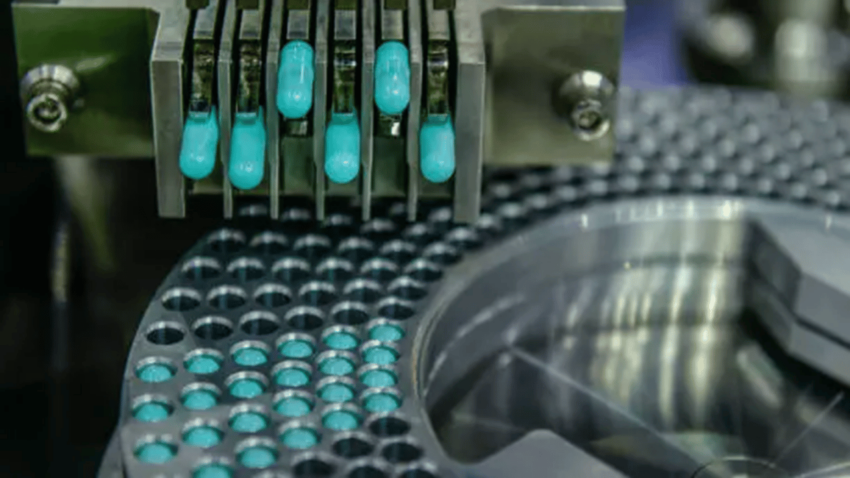Capsules are increasingly adopted in the form of pharmaceutical and nutraceutical deliverable systems. Efficiently encapsulating medication or supplements makes the manufacture of capsules a critical process in the pharmaceutical sector. With the help of capsule making machines, manufacturers are able to produce high-quality capsules quickly and in large quantities. This article will detail the types of capsule making machines there are, how these machines work, their advantages, and why some companies may seek such machines. Some dependable solution providers like KTETGROUP for capsule production will also be introduced.
What is a Capsule Making Machine?
Capsule making machines refer to equipment that specializes in the production of capsules that are filled with powders, granules, and even liquids. Most Capsules contain active ingredients such as medicines, vitamins and supplements which are packed into capsules industry wide. These machines came into existence in order to automate the capsule production process which has become laborious, leading to reduced time and human error in the final output.
Capsule filling machines fall into two major categories, which are soft and hard gelatin capsule filling machines. The major difference is in the equipment for soft gels due to the unique characteristics of the gelatin and the more stringent equipment requirements. However, the overall process remains the same.
If you’re looking to improve your production capabilities, KTETGROUP has some printing label machines you may want to consider that will aid in branding and packaging, which can be easily integrated into your existing capsule production line.
Types of Capsule Making Machines
There are a number of different types of capsule making machines which can also be classified based on the level of production volume they can handle and the type of capsule. The most common types include:
Semi-Automatic Capsule Filling Machines
These machines are more suited for small to mid-level production volumes. Cap filling contracts. This subgroup of machines is semi automatic, meaning that a certain degree of manual work is still needed. A portion of these machines require operators to fill the capsules with powder or granules. They do however place empty capsules into them, and the machine fills, closes, and ejects them into a collection area. Because of this adaptability, semi-automatic machines are highly adaptable and preferred in businesses producing lower volume batches of capsules or for those that require flexible formulation components in their capsules.
Fully Automatic Capsule Filling Machines
Minimal human interaction is needed in fully automatic capsule filling machines which are built for high productivity. These machines can fill and seal hundreds of thousand capsules in a matter of hours which makes them suitable for large pharmaceutical companies or manufacturers who make capsules on a large scale. Captured in fully automated systems are strong controls along with a vast range of capsule size, formulation, and material. Furthermore, these systems are also equipped with high-level monitoring devices like weight checking, capsule integrity testing, and particle size analyzing for effectively controlling the product’s quality.
Rotary Capsule Filling Machines
Produced in large quantities, rotary capsule filling machines offer high speeds. Unlike traditional linear filling machines, these machines are designed to fill capsules in a continuous rotation which greatly increases the amount of filling done within a specific time period. Often used for high over-the-counter pharmaceutical capsules or nutraceuticals, rotary machines are typically used for products needing accurate and precise filling. The design enables simple changeovers in capsule sizes, filling weights, and other parameters.
Hand Operated Capsule Filling Systems
A manual capsule filling machine is a type of low-cost equipment, often used by individual capsule producers or small-scale manufacturers. This capsule filling machine is simple to operate. With these machines, users have to load the capsules, and fill them with the material they need manually. These devices are more work intensive, but for businesses that do not require high volumes of capsules, these machines are more economical.
Capsule Filling Equipment
These machines are intended for use in the manufacture of soft gelatin capsules, primarily for use in liquid-filled formulations. These machines construct the soft capsule covering and fill the capsule with liquid or semi-solid material. Encapsulation of soft gels is more difficult than that of hard gelatin capsules and requires accurate temperature control for the soft gel to be formed and sealed properly.
Most Important Steps in Making Capsules
Using a capsule making machine has a few main steps. Let’s take a look through the processes involved with filling capsules with various devices.
1. Preparation of Capsule Shells
The equipment being used will prepare capsule shells as the first step. Capsules made of hard gelatine have two components: body and cap. The machine receives the empty capsules, and the parts are readied in a split position; both upper and lower parts both split open.
2. Filling the Capsules
Transitioning to the next step, filling the capsules with desired constituent, these could be granules, powder, or even liquids. The fully automatic capsule filler has a special feature, a dispensing arm that extracts either the powder or liquid from the holding tank and pours it into the open capsules situated beneath it. In order to maintain accuracy, the machine/robot uses a feedback controlled dosing mechanism and inbuilt system which guarantees every capsule receives the appropriate amount of highly potent powders.
3. Closing the Capsules
After the capsules have been filled, the machine closes the capsules by automatically affixing the cap on the body. Most of the equipment has a special automation feature that facilitates locking the cap into position. Once the capsules are sealed, they will be ready for collection.
4. Ejection and Inspection
Once the capsules are filled and closed, they are ejected from the machine. Most modern capsule making machines have automatic inspection systems that check for defects in the capsules such as cracks, improper sealing, and weight differences. This step helps maintain quality assurance by making sure top grade capsules are not compromised during the production process.
5. Optional: Post Production Packaging.
As is the routine after production, capsules are packaged into bottles, blister packs and other containers. Some capsule making machines have the option of being fitted with packaging systems that automatically package the capsules which simplifies the entire production process.
Advantages of Capsule Making Machines
Acquisition of capsule making machines comes with a number of benefits especially for pharmaceutical and nutraceutical producers. Here is a list of the most notable advantages
1. Best Utilization of Time.
Time saved by automating the capsule production process is significant. Capsule making machines are capable of filling and sealing hundreds and sometimes even thousands of capsules per hour. This is extremely beneficial in comparison with manual methods of production. This is especially important for large-scale manufacturers with a significant capsule production target.
2. Consistency and Accuracy
Accuracy is assured through capsule filling machines as they guarantee every capsule has the same weight of material within it. In an industry such as the pharmaceutical sector, these capsule formulators are vital as even the smallest of discrepancies can cause tremendous problems. These devices are sophisticated and hence are able to consistently perform within strict bounds of measurement for dosing and weight.
3. Cost-Effectiveness
A manufacturer could spend a lot at once when purchasing a capsule making machine, however, in the long run, the savings balance out. Businesses are able to automate processes which decrease the amount of hired hands, material that’s misused, and work that is done by machines increases, which altogether increases profit margins.
4. Flexibility In Formulation
Capsule making machines can work on a number of different formulations such as liquids, gels, and powders. This allows manufacturers to produce capsules for a variety of applications ranging from pharmaceutical drugs to dietary supplements.
5. Improved Quality Control
Defective products which could possibly harm users are noticed early by many advanced machines that have modern monitoring systems as they are able to check the quality of every capsule. These include the weighing of the capsule, checking to see whether there are borders, the other elements that are required to check if the capsule is actually what it claims to be, and so on.
Uses of Capsule Filling Machine
Capsule filling machines are useful in a variety of businesses. Here are some of the most common uses:
1. Pharma Industry
In the pharma industry, capsule filling machines are used to make capsules containing prescription or OTC pharmaceutical products. Each capsule may contain an active component that can be administered into the body gradually to enable patients to conveniently and effectively take their medicine.
2. Nutraceuticals
Often, nutraceutical companies manufacture capsules containing multi-vitamins, dietary minerals, herbal extracts and other nutritional supplements using capsule filling machines. The capsules are usually very appealing to the target audience as they promote wellness and health.
3. Cosmetics and Personal Care
In cosmetics, soft gel capsules are used for packaging beauty supplements or other cosmetic formulations. These capsules provide a more palatable way of consuming beauty products aimed at skin health, hair growth and other cosmetic benefits.
4. Animal Health
Capsule filling machines are also utilized in the manufacturing of veterinary medicines whereby capsules containing animal medication are filled. Such capsules are created with pet animals in mind, and they may include special veterinary ingredients, so they are easy for them to swallow.
5. The Food Industry
Also, in the food industry, capsule filling machines may be employed in the production of dietary supplements, for instance, capsules containing oils, flavoring, and other food additives. These capsules serve to help constituents reach consumers in exact and controlled quantities.
Conclusion
KTETGROUP, for instance, offers capsule production solutions, allowing businesses to manufacture quality capsules at affordable prices. Visit KTETGROUP for additional equipment and technology, like their https://www.ketegroup.com/es/product-category/label-printing-machines/ , which can be used alongside your capsule production line for effective marketing and packaging enhancement.Capsule making machines represent a key innovation in the pharmaceutical and nutraceutical industries because of their numerous benefits such as increased efficiency, accuracy, and decreased cost. Businesses looking to benefit from the diverse types of capsules can take advantage of the many capsule possibilities available.







